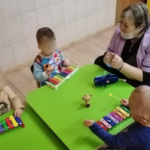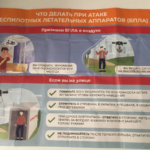“Salvation in independence”: actions of representatives of nations held captive by Moscow took place in 11 cities around the world

Last weekend, the Free Nations League held rallies and pickets in Europe and the United States. The organization, which unites representatives of the national and regionalist movements of the nations held captive by the Russian Federation, has brought supporters of the independence of the national republics and separate Russian territories to the streets.
“Rallies and pickets are only a part of the events with which we join the Captive Nations Week, officially established in 1959 by US President Dwight Eisenhower. According to the special resolution drawn up by the Ukrainian scientist Lev Dobryansky, there was established annual holding of a cycle of events in the third week of July, devoted to the peoples under the oppression of communist Russia. Later, the focus of the Captive Nations Week shifted towards human rights issues. However, this year, announcing the Captive Nations Week, the US President for the first time mentioned Russia — he put it first among all repressive regimes,” explains Ruslan Gabbasov, a member of the FNL and head of the Bashkir National Political Center.



The easternmost city where the League action took place was the Estonian Tartu, where there is a cell of political emigrants of Finno-Ugric origin. The representative of the people of Erzya, Aris-Anton Smirnov, came to the city’s main square with his friends, among whom was Alexey Ivanov, wanted by the Russian police. A criminal case was opened against Ivanov because he called as “fascists” the police officers who approached him during the anti-war picket on February 24 and demanded to introduce himself. Alexey is also known for communicating with representatives of the government in the Komi language. During one of the detainments the young men asked for translation of the protocol into Komi language, but the Russian security forces refused to invite an interpreter. In response, the activist refused to sign the protocol. In March of this year, Ivanov asked for asylum in Estonia.
A significant part of FNL activists are political emigrants of the new wave, activists of national movements who left the Russian Federation already in 2022. However, there are those who emigrated earlier, such as the Tatar activist Rafis Kashapov, who spent a three-year term in a Russian prison for his political views, in particular, for condemning the annexation of Crimea. Rafis’s brother Nafis Kashapov is also a political emigrant. Both brothers, members of the “Free Idel-Ural” movement, held actions in Great Britain and the Czech Republic.
Kashapov’s associates — Tatar emigrants in the Netherlands (Dinar Minkaev and Dinar Sagdeev), Sweden, Montenegro (Nafisa Gubaidullina), Turkey and the USA also took part in protest actions. A Tatar activist Irshat Khaby, together with an associate with an Erzya flag, held a picket at the Consulate General of the Russian Federation in New York. There is a poster at Irshat’s feet with the inscription in the colors of Tatarstan “Tatars are not slaves! Tatarstan is not Russia!”
“I learned about the Free Nations League from my Tatar friends. In this organization there are both Turks and Finno-Ugrics, both Muslims and Buddhists. Ingermanlander regionalists with nationalist Cossacks. All of us are united by the desire to gain freedom and leave the Russian Federation. Personally, I believe that now our Tatar people have a historic chance. It is necessary to use it. Our salvation is in independence!” — says Irshat, while passers-by look at the activists’ posters and flags.
In the USA, in addition to New York, pickets also took place in Philadelphia and Cleveland. The organizer of the action in Cleveland is Erzya activist Vitaly Romashkin. A tall young man holds in his hands a white-red-black flag — the banner of the Erzya national movement. Vitaly explains: “I invited my American and Ukrainian friends to the event. They know that I am neither a “good Russian” nor a “bad Russian”. I’m not Russian at all! I am Erzya by nationality, and I have a clear understanding that the rapid reduction of the number of Erzya, the aggressive policy of assimilation of my people, as well as other enslaved peoples, is something that Russia is proud of and that Russian society considers a great success. They cannot be proud of Russian medicine and social welfare, but they are proud of assimilation. I have no desire to save Russian culture, as well as Russia in general. This prison of nations must be destroyed, and the Erzya Nation must gain Independence.”
The action in Philadelphia was organized by a Buryat Radjana Dugar-DePonte, Kalmyks Albert Sharapov and Dordzhi Mandzhiev. A group of activists with national flags gathered in the square in front of the art museum — a traditional place for political rallies in the city.
Albert talks about the evolution of his political views: “I became a supporter of the Independence of Kalmykia while still being a patriot of Russia. I considered Russia a friendly country to Kalmykia. Therefore, I did not see any problem in separating, because this would bring only advantages to Kalmykia. But my countrymen convinced me that the Russians would come in tanks and kill us all. After that, I naturally ceased to be a patriot of Russia, and after a while I ceased to consider myself a Russian and a citizen of Russia. In 2014, during the Maidan, I wished Ukrainians victory over pro-Russian groups, entry into the EU and NATO. If this happened and Ukrainians began to live better, then people in Kalmykia would see this as an example for themselves. Of course, Putin could not allow this. This is why he began aggression against Ukraine. But what he did in February 2022, I do not find any logical explanation. Pure madness. I am against Kalmykia remaining in Russia after Putin, our people will not survive the next bout of insanity of the Russian people.”



Cossack activist Vyacheslav Demin also held a single picket in Spokane, Washington. In 1984, he was imprisoned for anti-Soviet activities, after which he was sent to exile in Kazakhstan. He was released during Gorbachev’s perestroika in 1987, among a large group of amnestied political prisoners. Vyacheslav fights for recognition of the Cossacks as a separate people by the international community, and is a supporter of the idea of the independence of Cossacks – the state of the Cossacks, which is mentioned in the resolution of the US Congress in 1959.
Actions were also held in Germany, where Ilshat Kinzyabaev, representative of the Bashkir National Political Center, organized a picket in the center of Frankfurt am Main. A group of Ukrainian emigrants joined him.
Another action was held in Vilnius. In the Lithuanian capital, the associates of the deputy chairman of the Congress of the Oirat-Kalmyk people, Vladimir Dovdanov, who while being still in Kalmykia signed an appeal in support of Ukrainians at the beginning of the full-scale invasion of the Armed Forces of the Russian Federation in Ukraine, as well as the representatives of Ingermanland regionalists Mike Ingram, came to the Cathedral Square in the Lithuanian capital. Marat Shakurov of the Bashkir National Political Center spoke at the rally.
A picket against Russia’s war and imperial policy was also held in Turkey. In one of the squares in Antalya, the Tatar national activist Farit Zakiev held an action of the Free Nations League. As in Germany and Lithuania, activists from Belarus and Ukraine came to support the restoration of the independence of the occupied countries.
In total, the Free Nations League was able to mobilize its supporters in Estonia, Sweden, Lithuania, Germany, the Netherlands, Montenegro, Great Britain, the Czech Republic, Turkey, and the United States. The geography and involvement of participants from the latest wave of political emigration indicate a growing interest in the ideas of independence among national and regionalist movements within the Russian Federation.
“Thanks to our series of events held throughout the Captive Nations Week, we managed to establish new contacts both with our emigrants and with Ukrainians, Belarusians, Lithuanians, Estonians and representatives of other nations. The most important thing is that the number of contacts with our compatriots who remain in the territory of the Russian Federation has increased. Our actions will not be limited to pickets in emigration. We will prepare our allies for a forceful confrontation with the Kremlin regime,” concluded Vladimir Dovdanov, one of the co-founders of the Free Nations League.









1 comment so far